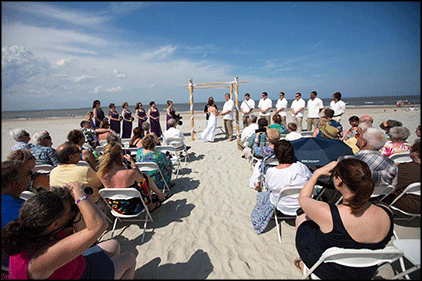All of the pieces and parts of your wedding have one thing
in common: Each has a price tag.
With a little imagination, plenty of planning and thought
and confidence, you can trim the budget. A little here, a little there – and
the next thing you know, you’ve saved potentially thousands of dollars.
Here are some ideas.
Use a wedding coordinator: A good coordinator or planner may seem like
an additional expense. However, the expertise a good coordinator brings to the
event should be focused around giving you the special day you want – while
saving you money.
Coordinators have long-term relationships with lots of
different vendors who will often extend special pricing – because they know a
coordinator’s event will be stress free.
Spend a little to save a little.
Choose a professional caterer: Yeah, that sounds a bit self-serving.
Just like a wedding coordinator, a professional caterer knows how to shave a
bit here and there or offer other suggestions to help keep your entertaining
budget in line. Rely on the expertise of others to relax the strain on your
bank account!
Invitations: One of the most common suggestions for saving a
huge amount of money up front is to use handmade or inexpensively printed
invitations instead of engraved invitations.
Be honest, that engraved invitation that you paid $4 each for
hits the trash can as soon as your guest puts the date on the calendar. Why not
ask a graphic designer friend – or your talented self – to create a
one-of-a-kind invitation that can be printed on a home printer or at a printing
center?
Have fun, put your personalities into the invitation – that
will be much more memorable to guests than a stereotypical, engraved
invitation.
Avoid guest list bloat: Early on, define who will be invited
– and stick to it. Simply, invite only those who are closest to you and your
partner. Do you each have lots of college friends who still live in the same
town? Coordinate with them and live stream your ceremony via Skype – while
those friends celebrate at a party of their own. Sen a DVD to far-flung family
members.
The tunes: No wedding reception is complete without music –
and we all remember the fun scenes from “The Wedding Singer.” Still, a full
band can run into the thousands of dollars – a DJ will likely be a few hundred
bucks and can do just as much to entertain the crowd. For a smaller affair the
couple’s favorite songs assembled into a playlist and pumped over a great sound
system may be plenty. Still want live musicians? Check with local musical
instrument stores – they may know of a “pick-up” duo or trio who will give you
live music for a few less dollars. Remember though: Musicians are professionals
just like chefs and wedding coordinators – and should be paid accordingly.
Booze by the numbers: If a full bar is in your plans, pay
for alcohol service by the head – not by the drink. Even casual drinkers will
belly up to a free bar. A per head fee will be much better on the budget versus
per drink – which can reach $7.50 per drink or more. For an early afternoon
wedding – consider keeping alcohol service limited to wine and beer.
Timing is everything: An afternoon wedding allows you to
reign in bar costs with just wine or beer – see above. It also allows reception
food to become light appetizers and cake instead of pricier heavy apps or
dinner service. Maybe a very small private ceremony is your thing. Take the
honeymoon – then come back and host a big backyard BBQ for you to celebrate
with friends and extended family.
Network your worries away: I’m always amazed when I post an inquiry
on social media sites. Wow, I often have resources that I didn’t know I had.
Maybe you have a long lost cousin who is a professional photographer – and
would love to “gift” you photography. Your aunt’s best friend is a newly opened
florist who will swap flowers for a business card on every guest’s seat. Your
nephew is a graphic design student who needs a project – invitations!
Ask, and you will likely receive!












